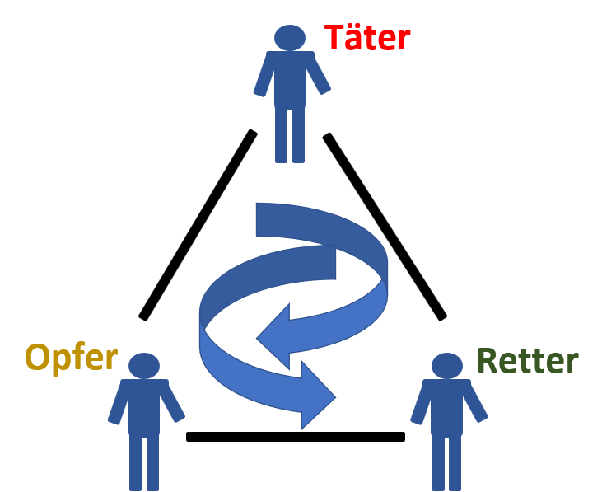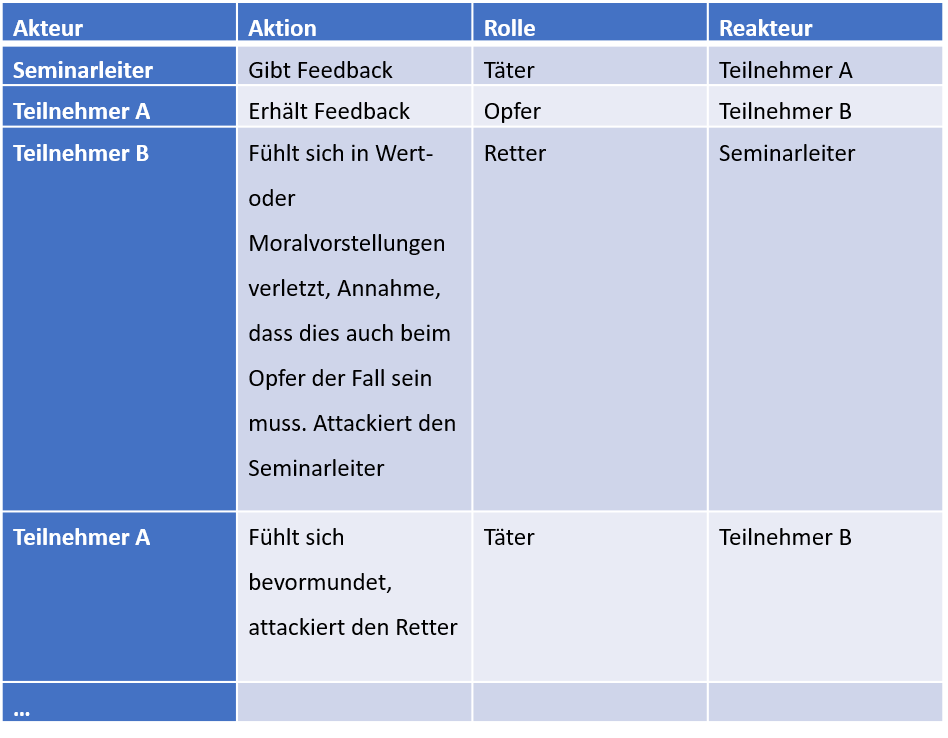Drama Triangle
The Drama Triangle is the basic pattern of a so-called game in a psychological sense.
Drama Triangle
Drama Triangle
The Drama Triangle is a psychological model from Transactional Analysis. It mainly describes the behavior and approach of at least two actors during a conversation.
In Transactional Analysis, these behavior patterns are called "games."
A game in the psychological sense is a series of individual transactions where the player (stimulus giver) pursues a hidden motive to gain a usually destructive benefit.
The unique aspect of the Drama Triangle is that roles can change in an instant.

Reference Story
Imagine a couple sitting in a restaurant. A lively discussion arises about a topic when the man suddenly lunges forward and grabs his wife's wrist. A waiter, who noticed the situation from the corner of his eye, wants to help the woman and demands the man: "Let go of the woman immediately!" In this scene, the woman becomes the victim, the man the perpetrator, and the waiter the rescuer.
Since the waiter misjudged the situation and the woman responds to his demand: "How dare you speak to my husband like that?", the roles within this group change. The man then calms his wife: "Honey, leave the poor waiter alone." Now the man is the rescuer, the waiter the victim, and the woman is the perpetrator.
This reference story clearly shows how quickly roles can change within a transaction.
Actors (Roles) of the Drama Triangle
Rescuer
The rescuer perceives that the (supposed) victim needs help and acts accordingly. He attacks the perpetrator.
Victim
The victim does not feel like a victim and attacks the rescuer. At this moment, their role changes from victim to perpetrator. The rescuer's role changes to that of the victim.
Perpetrator
The perpetrator seemingly attacks the victim. He makes the victim feel not okay.
Relevance in the Seminar Context
The pattern is important in the seminar context, especially for the feedback process. For the trainer, it is crucial not to take on any of the roles. However, the trainer is initially the perpetrator in the feedback process.
As soon as a psychological game starts, it must be interrupted immediately.
Interrupting the Game
A discovered game cannot be played to the end.
To interrupt the game, the trainer steps forward and draws attention to themselves, for example, by raising their arms and exclaiming:
"Stop Stop Stop Stop Stop! Something very interesting is happening here."
It is important to radiate positive energy (e.g., by smiling). Since the participants' attention is now on the trainer, the game is interrupted. However, the game still needs to be uncovered. The trainer must describe what happened in a way that no actor is hurt.
A reference story can be told to illustrate the Drama Triangle. Afterwards, it must be noted that all actors acted with good intentions. Finally, it is asked whether the situation is now acceptable or resolved for all actors. This way, all actors feel appreciated and are willing to continue participating.
Example
In the feedback process, a situation described by the Drama Triangle might look like this:

